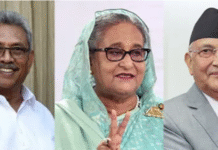
It looks like things have suddenly become murky. Then again, since the change of scene after 5 August, things were never quite crystal clear either. We saw a debate on the very day that the interim government took oath. It was being said that the government shouldn’t have been sworn in by Md Shahabuddin, the president elected by Sheikh Hasina. They said that it was a revolution that took place on 5 August and the revolutionary government should have been sworn in at the Shaheed Minar by the father of a martyr of the movement.
However, Professor Yunus was not involved in the concept of this revolution. His growth and ascension to fame was an entirely by means of a democratic process. From the very outset he felt that in order to restore democracy in the country, it was essential to establish inclusive politics. And he has openly stated this several times. But many of those with him, the students in particular, were more of the radical or revolutionary ilk.
Readers, if you pay a little attention you will see that over these past six months a conflict is at play due to these differences in mindset. The fact that Md Shahabuddin is still the president, is a fallout of this conflict. Many, though, feel that it is because BNP refused to allow him to be removed that he is still in the seat of president. There is truth in that too. But it is also true that if the Yunus government did not want him, he would not be in that office. Shahabuddin was not removed, despite strong opposition from the students whom Dr Yunus refers to as the ones who primarily recruited him and who he sees as the future.
There are times that the students, in a manner, oppose the Yunus government. The government of Professor Yunus has either swallowed this in silence or strategically managed the situation. For example, there is the matter of the July Charter. The students have a sort of radical perception about the July uprising. It is this that has led to the matter of a July Charter. But time has passed. Six months have passed and the July Charter no longer bears such relevance. But the students are serious about this. They are blaming the government for the charter not being declared.
The government has dealt with the matter in an extremely cool-headed manner. They say that the matter will be finalised on the basis of consensus among all. Now it’s being called a ‘declaration’. Will it be feasible for all political parties to reach a consensus regarding a declaration on the July uprising? There hardly seems any activity in this regard.
People say that those who can actually be called devils are no longer in the country. Many of them had been kept in the cantonment. How they slipped out of there and hopped over to the neighbouring country is like a tale of the Arabian Nights
I began with reference to the prevailing murky situation. All of a sudden there was an outburst across the country of houses being destroyed and demolished, set on fire. It began with the destruction of Sheikh Mujib’s house at Dhanmondi 32. The conflict within the government to which I referred, also has played a part in this. The harm rendered to the country by Awami League and their collaborators over the past 15 years, the brutal torture and repression unleashed on the people, was horrific. It can hardly be expected for the pent-up anger of the people to be dissipated overnight. The people do not want their return. But what decision will be taken about this, in the government’s inclusive politics?
As I said before, the matter is extremely complex. Will the switch over from fascism to democracy come about by democratic means? Or aggressively, by force? It is not difficult to discern that Professor Muhammad Yunus want this to come about by democratic means. But why will the hot-blooded youth acquiesce to this? This youth may well rise up in anger by the instigative statements being made by the autocratic who fled the country and has taken refuge in the neighbouring country. But it is true that unless we control ourselves, the autocrat may intentionally provoke reactions to disrupt law and order in the country.
The chief advisor wrote in this regard on his verified Facebook page that what had happened was unwarranted. He said that such incidents must not be repeated. The next day it was officially announced that if anyone took part in such disruptive activities to destabilise the situation, stern action would be taken. But this did not bring the situation under control. On the contrary, more damage and destruction of houses took place in the districts.
The chief advisor’s concern certainly must have come from deep feeling of consternation. Through an epoch-making uprising we overthrew one of the worst fascist rules in the world. This is to be followed by a building up of democracy. And this requires a national election credible to all. We are advancing in this direction. We have taken up reform processes to ensure that this election is truly of credible standards. This struggle is not one of protest and demonstration now, but of intellect and elevated process. This requires a peaceful environment. The local and foreign elements that we defeated are unwilling to accept our victory. They will try to provoke our people, try to create disorder. We must be constantly alert. We must not step into their trap.
Personally speaking, I do not want to regard the fallen autocrats as anything very massive. They certainly were organisationally big and powerful. But their mortal strength has been destroyed by what they have done over the past 15 years. Even if they ever get the chance to come out into the open again, they will have nothing to defend their actions of these 15 years. Politics is not simply a matter of force. It requires a strong moral narrative. The fallen Awami autocrats and their collaborators do not have this. They will only manage to gain space if we falter, if we make mistakes and give them that space.
Now, back to the discourse on the murky situation. I said that work had begun of the reform process. Six of the 15 reforms commissions have submitted their reports. On 15 February the first meeting was held between the political parties and the national consensus commission. In Bangladesh’s prevailing political perspective, this surely is the most important state activity.
But before that, the government launched Operation Devil Hunt. This perhaps was taken up due to the attack on the students in Gazipur and the inaction of the police. No investigation was carried out in this regard. However, the home ministry declared not a single ‘devil’ would be allowed to go free. But the people say that those who can actually be called devils are no longer in the country. Many of them had been kept in the cantonment. How they slipped out of there and hopped over to the neighbouring country is like a tale of the Arabian Nights. Those in the country are not the big fish. It is now like using a canon to kill a mosquito, as the Bangla saying goes. Will this yield as results or just a big zero?
The situation through which we are passing is hardly the time for humour. It is not a joke.
* Mahmudur Rahman Manna is the president of Nagorik Oikya
* This column appeared in the print and online edition of Prothom Alo and has been rewritten for the English edition by Ayesha Kabir









